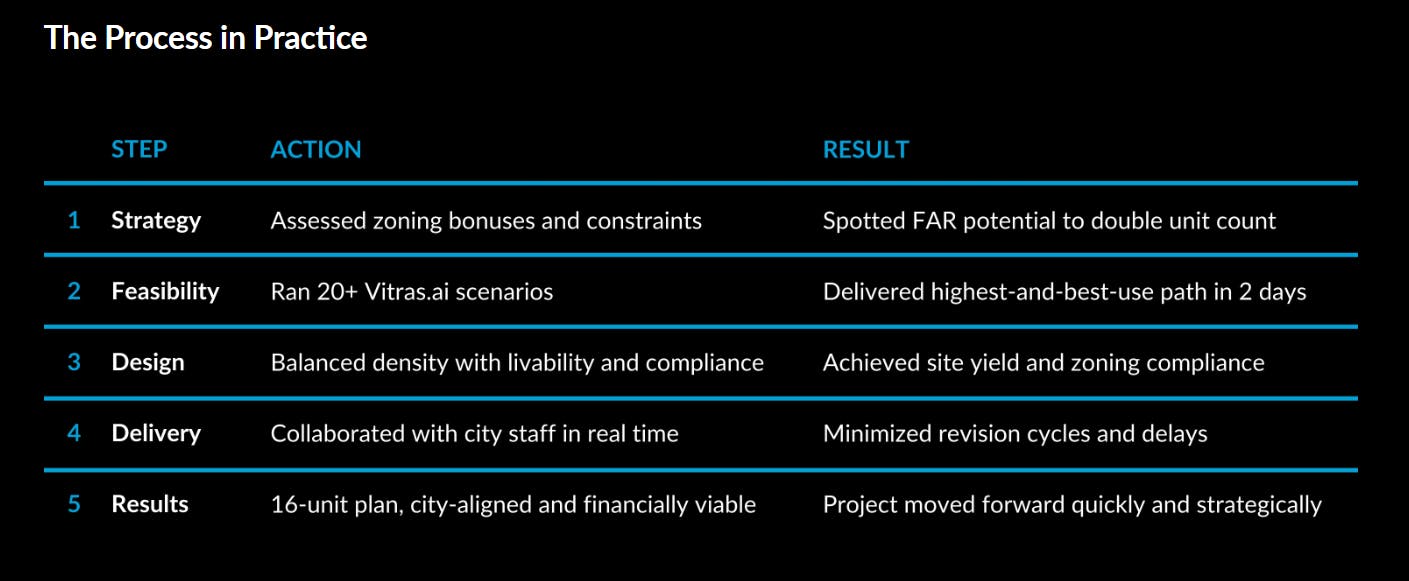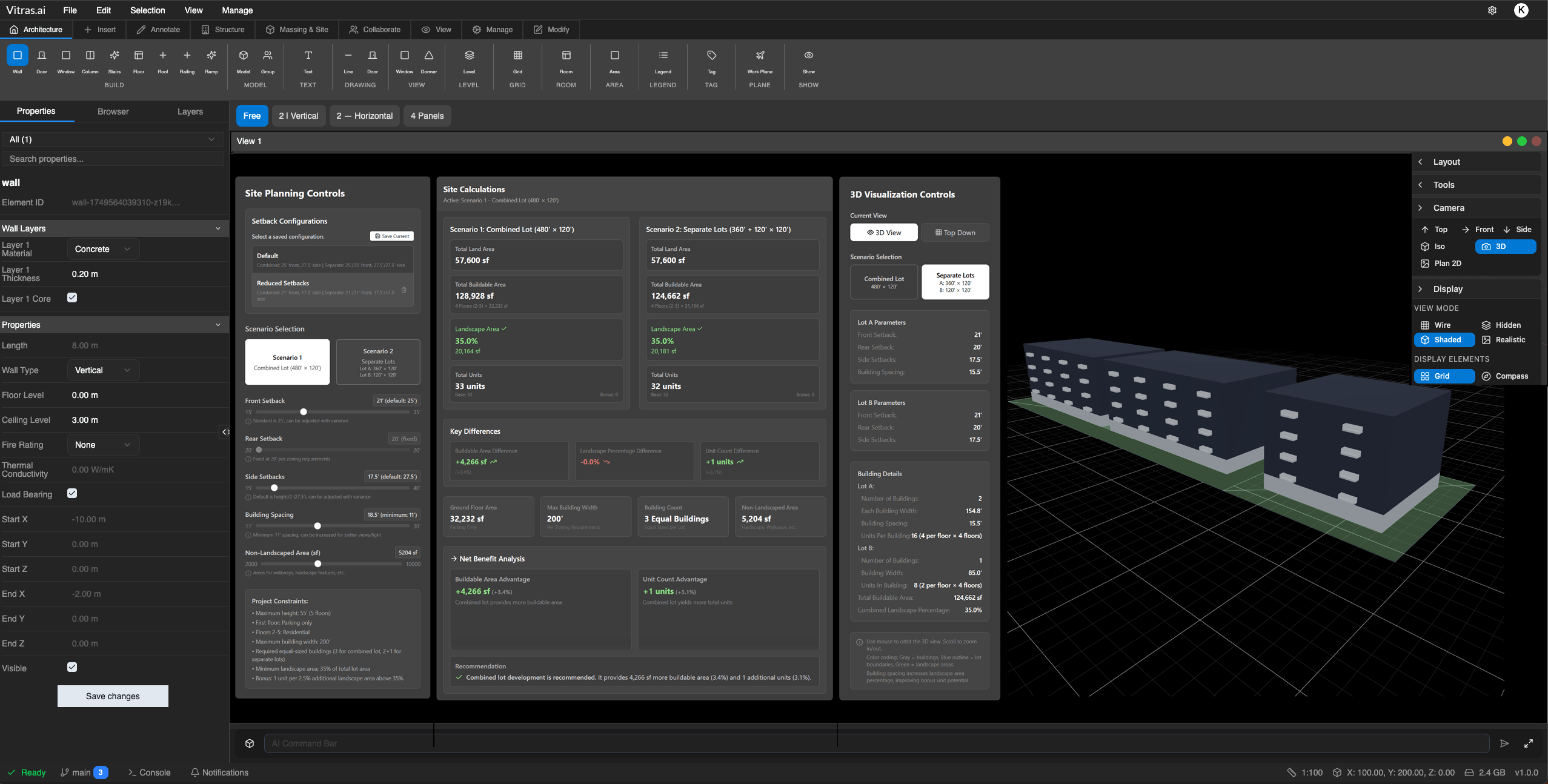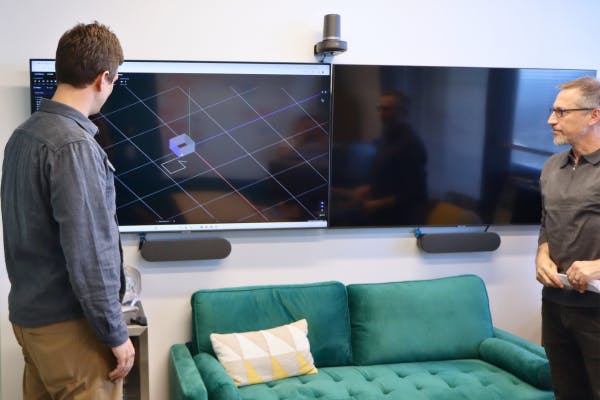Table Of Contents
- 1. Project Viability and ROI with AI in Architecture
- 2. AI in Architecture Enhances Speed and Efficiency
- 3. AI Assists in Architecture Cost Control
- 4. AI in Architecture Leads to Risk Reduction
- 5. AI Assists in ESG and Long-Term Value in Architecture
- 6. AI in Architecture Optimizes Communication, Increasing Transparency
- How cove Addresses These Developer Priorities
- AI, Architecture, and the Real Estate Developer
Table Of Contents
- 1. Project Viability and ROI with AI in Architecture
- 2. AI in Architecture Enhances Speed and Efficiency
- 3. AI Assists in Architecture Cost Control
- 4. AI in Architecture Leads to Risk Reduction
- 5. AI Assists in ESG and Long-Term Value in Architecture
- 6. AI in Architecture Optimizes Communication, Increasing Transparency
- How cove Addresses These Developer Priorities
- AI, Architecture, and the Real Estate Developer
Real estate developers face relentless pressure to deliver projects that are profitable, timely, and resilient in a rapidly evolving market. Between navigating zoning hurdles, optimizing for cost and efficiency, and meeting ambitious ESG goals, there’s a lot to juggle.
That’s where AI in architecture comes in.
The days of relying solely on human intuition and manual design processes are gone. Integrating artificial intelligence to accelerate feasibility studies, automate code checks, optimize energy performance, and deliver more confident and data-driven decisions is the best way to meet deadlines, stay within budgets, and maximize ROI.
Here’s a breakdown of how AI-driven architecture helps developers tackle their six biggest priorities:
1. Project Viability and ROI with AI in Architecture
AI in architecture enables smarter, faster feasibility analysis. Rather than relying on manual modeling or generic assumptions, AI platforms (like cove’s Vitras.ai) can evaluate dozens, or even thousands, of design options for a specific site in minutes.
Site selection and feasibility: AI analyzes zoning regulations, site constraints, and local building codes in real time to determine what’s actually buildable. You’ll know quickly whether a project can go forward, and in what form.
Zoning and code compliance: Instead of discovering zoning conflicts late in the process, AI checks every option for compliance before you invest time or money into design development.
Market demand alignment: By simulating unit mix, square footage, and amenity combinations against local market data, AI can help ensure you’re designing what tenants or buyers actually want.
ROI optimization: AI tools can generate the most profitable massing or unit mix based on yield calculations, helping developers zero in on schemes that deliver the highest return.

2. AI in Architecture Enhances Speed and Efficiency
Time is money in real estate development. Every delay, whether it’s a permit snag or a drawn-out design review, eats into margins. AI in architecture compresses timelines at nearly every stage.
Time to permit and break ground: AI pre-checks your design against city requirements, reducing the number of revisions needed to gain approval.
Faster construction documents: AI can assist in producing detailed construction documentation automatically, dramatically reducing hours of manual drafting.
Fewer revisions, less rework: With clash detection, energy modeling, and code checks running from the start, teams make fewer costly design changes midstream.
Real-world results? AI-driven projects have seen up to 50% faster design cycles compared to traditional workflows.

3. AI Assists in Architecture Cost Control
Cost overruns remain one of the biggest risks in development. Whether it’s material prices, construction change orders, or inefficient designs, the ripple effects are massive. AI in architecture helps rein it in.
Optimized construction costs: AI evaluates options for structural spans, facade materials, and layouts to find solutions that are efficient to build.
Operational savings: Early-stage energy modeling lets you choose designs that reduce heating, cooling, and lighting loads long-term.
Design-to-budget alignment: Rather than letting design drift out of scope, AI ties every decision back to budget impact, keeping teams grounded.
One developer cut renovation design iteration costs down to the lowest industry standard thanks to AI's role in architecture.

4. AI in Architecture Leads to Risk Reduction
Whether it's regulatory surprise, design flaws, or coordination errors, risk haunts every development. AI helps surface and solve issues early.
Design risk: Automated clash detection, rule-based code checks, and daylight simulations help catch design issues before they go to permitting or construction.
Construction risk: AI helps avoid scope creep by selecting construction systems and methods optimized for your budget and timeline.
Regulatory risk: AI checks your design against ever-changing zoning codes, flood maps, and fire egress rules, avoiding surprises that stall approvals.
AI in architecture has a countless benefits for real estate developers. Think of AI as a second brain that’s scanning for problems 24/7 while your architects design.

5. AI Assists in ESG and Long-Term Value in Architecture
Sustainability is no longer optional. Developers need to meet rising ESG expectations while ensuring their buildings are future ready. AI in architecture makes sustainability strategic.
Sustainability/ESG compliance: AI tools embed green building certifications and carbon benchmarks into the design process from day one.
Energy efficiency: With integrated modeling, architects can test HVAC, glazing, and orientation decisions quickly to lower energy demand.
Futureproofing: AI platforms can simulate design resilience against climate data (e.g. flood risk, heat stress) or track material sourcing for carbon impact.
Embodied carbon, energy use, and life cycle aren’t afterthoughts. AI brings them to the forefront in early decision-making.

6. AI in Architecture Optimizes Communication, Increasing Transparency
Real estate development is complex. So is architecture. Misunderstandings between architects, contractors, and developers can derail timelines and inflate costs. AI helps bridge the gap.
Clearer design intent: AI-powered platforms generate interactive visualizations, sun/shadow studies, and floor plan variants that are easy to digest.
Real-time collaboration: Everyone from the general contractor to MEP engineers can access a single source of truth for the design.
Data-backed confidence: You don’t have to take someone’s word for it: AI models how and why a certain design option is best.
Good decisions come from clear information. AI brings structure to the conversation.
How cove Addresses These Developer Priorities
At cove, we’ve built our entire full-service architecture firm around solving these exact challenges for real estate developers.
Utilizing our proprietary AI, Vitras.ai, our AI in architecture approach streamlines feasibility by analyzing zoning, massing, energy, and cost in a fraction of the time, ensuring every project starts with clarity and confidence.
From automated code checks, energy modeling, and clash detection accelerate design timelines, cove reduces rework and keep teams coordinated from concept to construction. Vitras.ai even assists in modeling predictive cost and carbon insights to empower developers to control budgets while meeting ESG goals. Through unified data, interactive visualizations, and real-time collaboration, cove eliminates communication gaps that often derail projects.
In short, cove operationalize AI in architecture so developers can de-risk decisions, maintain profitability, and move from idea to approval faster than ever.
AI, Architecture, and the Real Estate Developer
AI in architecture isn’t hype; it’s a working, proven toolkit that directly addresses the challenges developers grapple with every day: accelerating timelines, controlling costs, reducing risk, and ensuring long-term asset performance.
As the industry navigates tighter margins, higher ESG expectations, and increasing design complexity, AI has become the strategic advantage that separates projects that struggle from those that thrive.
At cove, we combine decades of architectural expertise with proprietary AI platforms that bring speed, transparency, and precision to every phase of development. Whether you’re evaluating site viability, optimizing massing, predicting energy performance, or aligning design with budget and carbon targets, our tools transform guesswork into confidence. We integrate feasibility, zoning, cost, carbon, systems, and code requirements into a single, intelligent workflow, helping teams make better decisions earlier, avoid costly surprises, and deliver higher-value projects with less friction.

